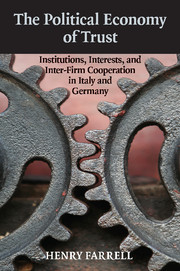 The Political Economy of Trust
The Political Economy of Trust Book contents
- Frontmatter
- Contents
- Acknowledgments
- 1 Introduction
- 2 A Theory of Institutions and Trust
- 3 Varieties of Capitalism and Industrial Districts
- 4 Trust and Institutions in Industrial Districts
- 5 Accounting for Change in Informal Institutions
- 6 Informal Institutions without Trust: Relations among Mafiosi in Sicily
- 7 Conclusions
- Bibliography
- Index
- Titles in the series
2 - A Theory of Institutions and Trust
Published online by Cambridge University Press: 24 September 2009
- Frontmatter
- Contents
- Acknowledgments
- 1 Introduction
- 2 A Theory of Institutions and Trust
- 3 Varieties of Capitalism and Industrial Districts
- 4 Trust and Institutions in Industrial Districts
- 5 Accounting for Change in Informal Institutions
- 6 Informal Institutions without Trust: Relations among Mafiosi in Sicily
- 7 Conclusions
- Bibliography
- Index
- Titles in the series
Summary
INTRODUCTION
I have discussed the gaps in the existing literature on the relationship between institutions and trust. But there is a broader research agenda, one that might help us arrive at answers to some of the key questions of comparative politics. What implications do informal and formal institutions have for the workings of the economy? How can we best understand the sources – and consequences – of trust and cooperation? Bringing these together, what effects do institutions have on the way that individuals trust (or do not trust) and cooperate with (or do not cooperate with) each other?
One of the main reasons that we do not have good empirical accounts of the relationship between institutions and trust is because of the weakness of our underlying theories of this relationship (Johnson 2003). As I have noted, some treatments of the relationship (including many prominent examples of the political culture approach) tend toward excessive vagueness, others (including many game theoretic accounts) are reductionist, treating trust merely as a highly determinate set of expectations. Thus, a more coherent theoretical account of the relationship between institutions and trust is a necessary first step toward a better empirical understanding of the relationship.
The most sophisticated accounts of trust that we currently possess have little room for institutions. Instead they stress personal relationships as the key source of information underlying trusting beliefs. Our theories of institutions are even less able to help explicate trust; dominant theories in rational choice effectively elide trust out of existence, concentrating on simple institutional compliance.
- Type
- Chapter
- Information
- The Political Economy of TrustInstitutions, Interests, and Inter-Firm Cooperation in Italy and Germany, pp. 23 - 62Publisher: Cambridge University PressPrint publication year: 2009
